新概念一册101到110课原文及译文
- 格式:docx
- 大小:18.12 KB
- 文档页数:9
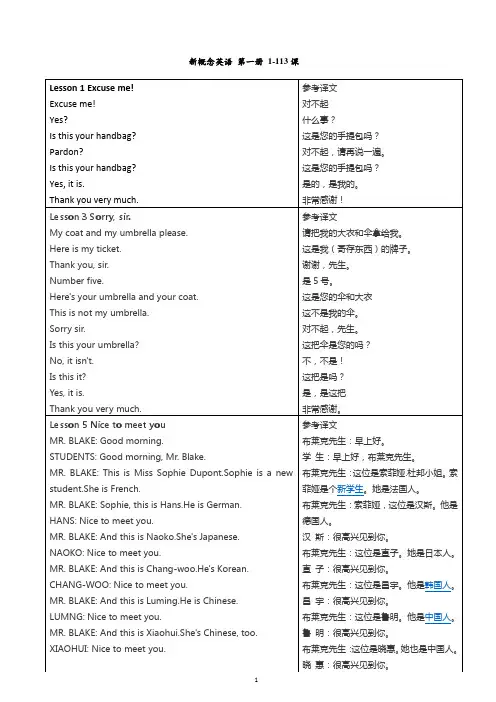
新概念英语第一册1-113课Lesson 1 Excuse me! Excuse me!Yes?Is this your handbag? Pardon?Is this your handbag? Yes, it is.Thank you very much.参考译文对不起什么事?这是您的手提包吗?对不起,请再说一遍。
这是您的手提包吗?是的,是我的。
非常感谢!Lesson 3 Sorry, sir.My coat and my umbrella please. Here is my ticket.Thank you, sir.Number five.Here's your umbrella and your coat. This is not my umbrella.Sorry sir.Is this your umbrella?No, it isn't.Is this it?Yes, it is.Thank you very much.参考译文请把我的大衣和伞拿给我。
这是我(寄存东西)的牌子。
谢谢,先生。
是5号。
这是您的伞和大衣这不是我的伞。
对不起,先生。
这把伞是您的吗?不,不是!这把是吗?是,是这把非常感谢。
Lesson 5 Nice to meet youMR. BLAKE: Good morning.STUDENTS: Good morning, Mr. Blake.MR. BLAKE: This is Miss Sophie Dupont.Sophie is a new student.She is French.MR. BLAKE: Sophie, this is Hans.He is German.HANS: Nice to meet you.MR. BLAKE: And this is Naoko.She's Japanese. NAOKO: Nice to meet you.MR. BLAKE: And this is Chang-woo.He's Korean. CHANG-WOO: Nice to meet you.MR. BLAKE: And this is Luming.He is Chinese. LUMNG: Nice to meet you.MR. BLAKE: And this is Xiaohui.She's Chinese, too. XIAOHUI: Nice to meet you. 参考译文布莱克先生:早上好。

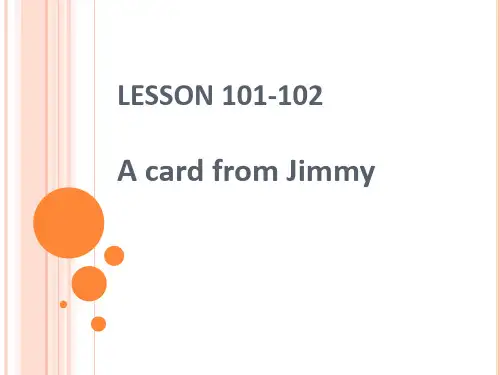

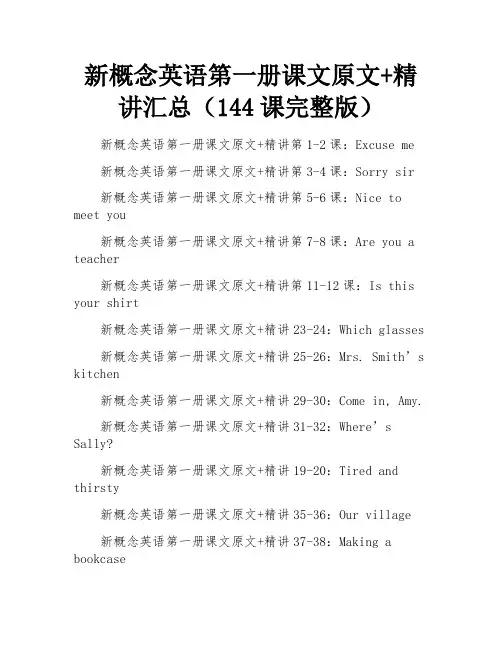
新概念英语第一册课文原文+精讲汇总(144课完整版)新概念英语第一册课文原文+精讲第1-2课:Excuse me新概念英语第一册课文原文+精讲第3-4课:Sorry sir新概念英语第一册课文原文+精讲第5-6课:Nice to meet you新概念英语第一册课文原文+精讲第7-8课:Are you a teacher新概念英语第一册课文原文+精讲第11-12课:Is this your shirt新概念英语第一册课文原文+精讲23-24:Which glasses新概念英语第一册课文原文+精讲25-26:Mrs. Smith’s kitchen新概念英语第一册课文原文+精讲29-30:Come in, Amy.新概念英语第一册课文原文+精讲31-32:Where’s Sally?新概念英语第一册课文原文+精讲19-20:Tired and thirsty新概念英语第一册课文原文+精讲35-36:Our village新概念英语第一册课文原文+精讲37-38:Making a bookcaseit!新概念英语第一册课文原文+精讲41-42:Penny’s bag新概念英语第一册课文原文+精讲33-34:A fine day新概念英语第一册课文原文+精讲43-44:Hurry up新概念英语第一册课文原文+精讲45-46:The boss’s letter新概念英语第一册课文原文+精讲47-48:A cup of coffee新概念英语第一册课文原文+精讲53-54:An interesting climate新概念英语第一册课文原文+精讲55-56:The Sawyer family新概念英语第一册课文原文+精讲57-58:An unusual day新概念英语第一册课文原文+精讲59-60:Is that all新概念英语第一册课文原文+精讲61-62:A bad cold新概念英语第一册课文原文+精讲63-64:Thank you , doctor新概念英语第一册课文原文+精讲67-68:The weekend新概念英语第一册课文原文+精讲69-70:The car race新概念英语第一册课文原文+精讲71-72:He’s awfulKing Street新概念英语第一册课文原文+精讲75-76:Unfortable shoes新概念英语第一册课文原文+精讲77-78:Terrible toothache新概念英语第一册课文原文+精讲81-82:Roast beef and potato新概念英语第一册课文原文+精讲83-84:Going on a holiday新概念英语第一册课文原文+精讲85课:Paris in the Spring新概念英语第一册课文原文+精讲87课:A car crash新概念英语第一册课文原文+精讲89课:For sale新概念英语第一册课文原文+精讲91课:Poor Ian新概念英语第一册课文原文+精讲93课:Our new neighbor新概念英语第一册课文原文+精讲95课:Ticket, please.新概念英语第一册课文原文+精讲97课:A small blue case新概念英语第一册课文原文+精讲99课:Ow!新概念英语第一册课文原文+精讲101课:A card from Jimmytest新概念英语第一册课文原文+精讲105课:Full of mistakes新概念英语第一册课文原文+精讲107课:It’s too small新概念英语第一册课文原文+精讲109课:A good idea新概念英语第一册课文原文+精讲111课:The most expensive model新概念英语第一册课文原文+精讲113课:small change新概念英语第一册课文原文+精讲115课:Knock,knock新概念英语第一册课文原文+精讲117课:Tommy’s breakfast新概念英语第一册课文原文+精讲119课: A true story新概念英语第一册课文原文+精讲121课: The man in the hat新概念英语第一册课文原文+精讲123课: A trip to Australia新概念英语第一册课文原文+精讲125课: Tea for two新概念英语第一册课文原文+精讲127课: A famous actress新概念英语第一册课文原文+精讲129课: 70 miles an hour新概念英语第一册课文原文+精讲133课: Sensational news新概念英语第一册课文原文+精讲135课:The latest新概念英语第一册课文原文+精讲139课:Is that you新概念英语第一册课文原文+精讲第141课:Sally’s first新概念英语第一册课文原文+精讲131课:Don’t be so sure。
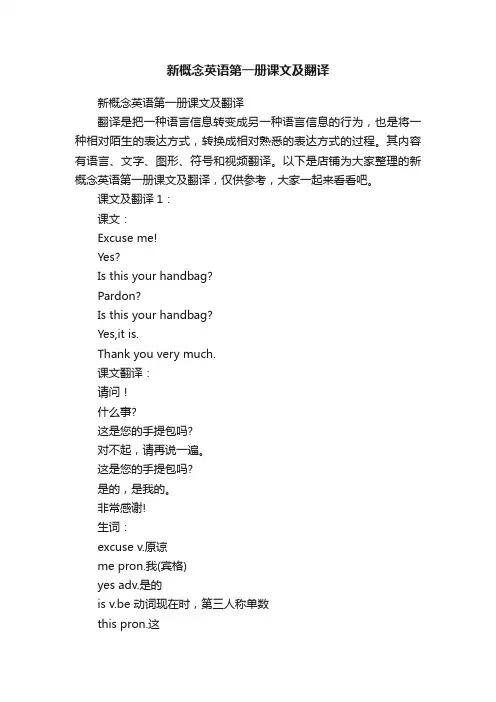
新概念英语第一册课文及翻译新概念英语第一册课文及翻译翻译是把一种语言信息转变成另一种语言信息的行为,也是将一种相对陌生的表达方式,转换成相对熟悉的表达方式的过程。
其内容有语言、文字、图形、符号和视频翻译。
以下是店铺为大家整理的新概念英语第一册课文及翻译,仅供参考,大家一起来看看吧。
课文及翻译1:课文:Excuse me!Yes?Is this your handbag?Pardon?Is this your handbag?Yes,it is.Thank you very much.课文翻译:请问!什么事?这是您的手提包吗?对不起,请再说一遍。
这是您的手提包吗?是的,是我的。
非常感谢!生词:excuse v.原谅me pron.我(宾格)yes adv.是的is v.be 动词现在时,第三人称单数this pron.这your adj.你的,你们的handbag n.手提包pardon int.原谅,请再说一遍it pron.它thank you.感谢你very much.非常地知识点讲解:1.Excuse me是一个很常用的词组,通常用来引起对方注意或是搭话。
它的字面意思是“原谅+我”,但一般不用来跟人道歉,道歉还是应该用sorry。
2.文中的yes有两种意思:其一是有人叫你时,回答对方;其二是表示肯定。
3.pardon本身也是“原谅”的意思,这里的意思是“不好意思我没有听清楚,请再说一遍”。
要对方重复,也可以说"Sorry?"4.Is this your handbag? 这是你的手提包吗?这是疑问句的句型,变成叙述句应该是:This is your handbag.这是你的包。
5.handbag,一般指女生用的手提包。
钱包是purse,男生的公文包是briefcase。
课文及翻译2:课文:During a bullfight,a drunk suddenly wandered into the middle of the ring.The crowd began to shout,but the drunk was unaware of the danger.The bull was busy with the matador at the time,but it suddenly caught sight of the drunk who was shouting rude remarks and waving a red cap.Apparently sensitive to criticism,the bull forgot all about the matador and charged at the drunk.The crowd suddenly grew quiet.The drunk,however,seemed quite sure of himself.When the bull got close to him,he clumsily stepped aside to let it pass.The crowd broke into cheers and the drunk bowed.By thistime,however,three men had come into the ring and they quickly draggedthe drunk to safety.Even the bull seemed to feel sorry for him,for it looked on sympatheticallyuntil the drunk was out of the way before once more turning its attention to the matador.课文翻译:在一次斗牛时,一个醉汉突然溜达到斗牛场中间,人们开始大叫起来,但醉汉却没有意识到危险。

新概念英语第一册1-113课Lesson 1 Excuse me! Excuse me!Yes?Is this your handbag? Pardon?Is this your handbag? Yes, it is.Thank you very much.参考译文对不起什么事?这是您的手提包吗?对不起,请再说一遍。
这是您的手提包吗?是的,是我的。
非常感谢!Lesson 3 Sorry, sir.My coat and my umbrella please. Here is my ticket.Thank you, sir.Number five.Here's your umbrella and your coat. This is not my umbrella.Sorry sir.Is this your umbrella?No, it isn't.Is this it?Yes, it is.Thank you very much.参考译文请把我的大衣和伞拿给我。
这是我(寄存东西)的牌子。
谢谢,先生。
是5号。
这是您的伞和大衣这不是我的伞。
对不起,先生。
这把伞是您的吗?不,不是!这把是吗?是,是这把非常感谢。
Lesson 5 Nice to meet youMR. BLAKE: Good morning.STUDENTS: Good morning, Mr. Blake.MR. BLAKE: This is Miss Sophie Dupont.Sophie is a new student.She is French.MR. BLAKE: Sophie, this is Hans.He is German.HANS: Nice to meet you.MR. BLAKE: And this is Naoko.She's Japanese. NAOKO: Nice to meet you.MR. BLAKE: And this is Chang-woo.He's Korean. CHANG-WOO: Nice to meet you.MR. BLAKE: And this is Luming.He is Chinese. LUMNG: Nice to meet you.MR. BLAKE: And this is Xiaohui.She's Chinese, too. XIAOHUI: Nice to meet you. 参考译文布莱克先生:早上好。
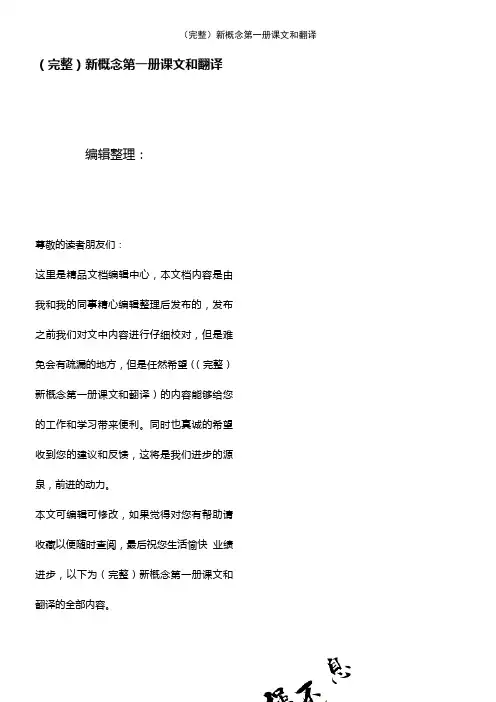
(完整)新概念第一册课文和翻译编辑整理:尊敬的读者朋友们:这里是精品文档编辑中心,本文档内容是由我和我的同事精心编辑整理后发布的,发布之前我们对文中内容进行仔细校对,但是难免会有疏漏的地方,但是任然希望((完整)新概念第一册课文和翻译)的内容能够给您的工作和学习带来便利。
同时也真诚的希望收到您的建议和反馈,这将是我们进步的源泉,前进的动力。
本文可编辑可修改,如果觉得对您有帮助请收藏以便随时查阅,最后祝您生活愉快业绩进步,以下为(完整)新概念第一册课文和翻译的全部内容。
课文1 对不起!1. Excuse me!对不起2。
Yes?什么事?3。
Is this your handbag?这是您的手提包吗?4。
Pardon?对不起,请再说一遍。
5。
Is this your handbag?这是您的手提包吗?6。
Yes, it is。
是的,是我的。
7。
Thank you very much。
非常感谢!课文3 对不起,先生。
8。
My coat and my umbrella please.请把我的大衣和伞拿给我。
9。
Here is my ticket.这是我(寄存东西)的牌子.10。
Thank you, sir。
谢谢,先生.11. Number five.是5号.12。
Here's your umbrella and your coat。
这是您的伞和大衣13。
This is not my umbrella。
这不是我的伞。
14. Sorry sir.对不起,先生.15。
Is this your umbrella?这把伞是您的吗?16。
No, it isn't.不,不是!17。
Is this it?这把是吗?18. Yes, it is.是,是这把19. Thank you very much。
非常感谢。
课文5 很高兴见到你。
20。
Good morning.早上好。
21. Good morning, Mr. Blake。
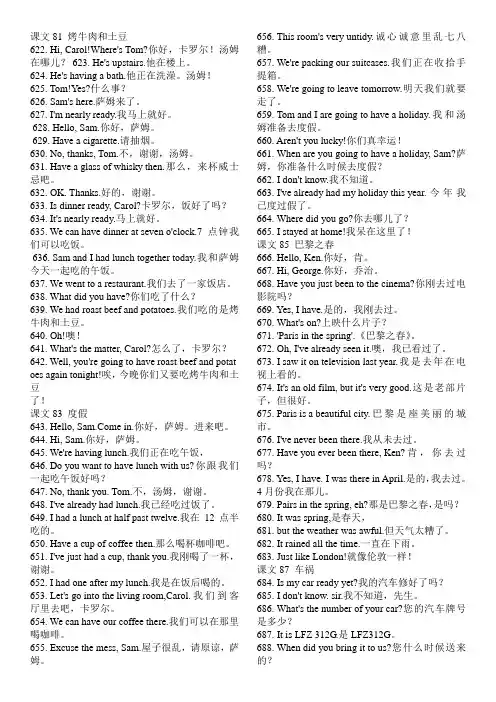
课文81 烤牛肉和土豆622. Hi, Carol!Where's Tom?你好,卡罗尔!汤姆在哪儿? 623. He's upstairs.他在楼上。
624. He's having a bath.他正在洗澡。
汤姆!625. Tom!Yes?什么事?626. Sam's here.萨姆来了。
627. I'm nearly ready.我马上就好。
628. Hello, Sam.你好,萨姆。
629. Have a cigarette.请抽烟。
630. No, thanks, Tom.不,谢谢,汤姆。
631. Have a glass of whisky then.那么,来杯威士忌吧。
632. OK. Thanks.好的,谢谢。
633. Is dinner ready, Carol?卡罗尔,饭好了吗?634. It's nearly ready.马上就好。
635. We can have dinner at seven o'clock.7点钟我们可以吃饭。
636. Sam and I had lunch together today.我和萨姆今天一起吃的午饭。
637. We went to a restaurant.我们去了一家饭店。
638. What did you have?你们吃了什么?639. We had roast beef and potatoes.我们吃的是烤牛肉和土豆。
640. Oh!噢!641. What's the matter, Carol?怎么了,卡罗尔?642. Well, you're going to have roast beef and potat oes again tonight!唉,今晚你们又要吃烤牛肉和土豆了!课文83 度假643. Hello, e in.你好,萨姆。
进来吧。
644. Hi, Sam.你好,萨姆。
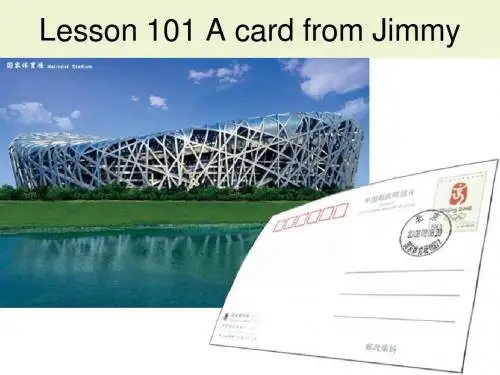
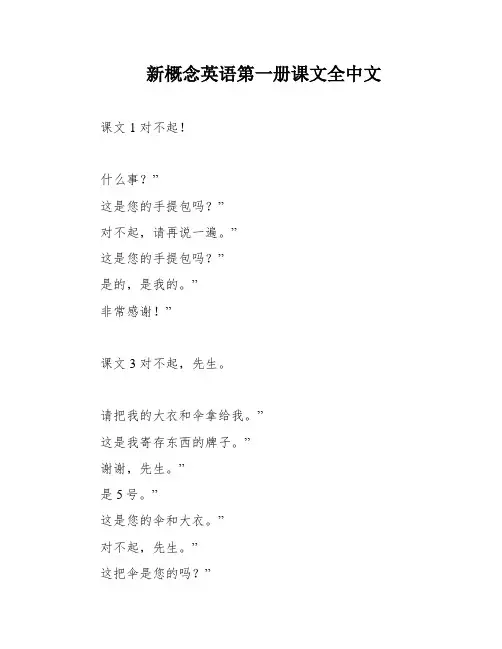
新概念英语第一册课文全中文课文1 对不起!什么事?”这是您的手提包吗?”对不起,请再说一遍。
”这是您的手提包吗?”是的,是我的。
”非常感谢!”课文3 对不起,先生。
请把我的大衣和伞拿给我。
”这是我寄存东西的牌子。
”谢谢,先生。
”是5号。
”这是您的伞和大衣。
”对不起,先生。
”这把伞是您的吗?”不,不是!”这把是吗?”是,是这把。
”非常感谢。
”课文5 很高兴见到你。
早上好。
”早上好,XXX先生。
”这位是XXX。
”XXX是个新学生。
”她是法国人。
”XXX,这位是XXX。
”他是德国人。
”很高兴见到你。
”这位是直子。
”她是日本人。
”很高兴见到你。
”这位是XXX。
”他是韩国人。
”很高兴见到你。
”这位是XXX。
”他是中国人。
”很高兴见到你。
”这位是XXX。
”她也是中国人。
”很高兴见到你。
”课文7 你是教师吗?我是个新学生,我的名字叫XXX。
”很高兴见到你。
”我的名字叫XXX。
”你是法国人吗?”是的,我是法国人。
”你也是法国人吗?”不,我不是。
”你是哪国人?”我是意大利人。
”你是教师吗?”不,我不是。
”你是做什么工作的?”我是电脑录入员。
”你是做什么工作的?”我是工程师。
”课文9 今天好吗?你好,XXX。
”你好,XXX。
”你今天好吗?”很好,谢谢你。
”你好吗?”很好,谢谢。
”XXX好吗?”他很好,谢谢。
”XXX好吗?”她也很好,XXX。
”再见,XXX。
”见到你真高兴。
”我见到你也很高兴,XXX。
”再见。
”课文11 这是你的衬衫吗?那是谁的衬衫?”XXX,这是你的衬衫吗?”不,先生。
”这不是我的衬衫。
”这是我的衬衫。
”我的衬衫是蓝色的。
”这件衬衫是XXX的吗?”也许是,先生。
”XXX的衬衫是白色的。
”XXX!”什么事,先生?”这是你的衬衫吗?”是的,先生。
”给你。
”接着!”谢谢您,先生。
”课文13 一件新连衣裙你的新连衣裙是什么颜色的?”是绿色的。
”到楼上来看看吧。
”谢谢。
”瞧,就是这件。
”这是件很好看的衣服。
”真漂亮。
新概念一册101到110课原文及译文Lesson 101 A card from Jimmy吉米的明信片GRANDMOTHER: Read Jimmy's card to me please, Penny.请把吉米的明信片念给我听听,彭妮。
PENNY: 'I have just arrive in Scotland and I'm staying at aYouth Hostel.' “我刚到苏格兰,我现住在一家青年招待所。
”GRANDMOTHER: Eh? 什么?PENNY: He says he's just arrived in Scotland.他说他刚到苏格兰。
He says he's staying at a Youth Hostel.他说他住在一家青年招待所。
You know he's a member of the Y.H.A.你知道,他是“青招协”的一个成员。
GRANDMOTHER: The what? 什么?PENNY: The Y.H.A., Mum. “青招协”,妈妈。
The Youth Hostels Association. 青年招待所协会。
GRANDMOTHER: What else does he say? 他还说了些什么?PENNY: I'll write a letter soon. “我很快会写信的。
I hope you all well. '祝你们大家身体都好。
”GRANDMOTHER: What? Speak up. Penny. 什么?彭妮,大声一点。
I'm afraid I can't hear you 我可听不见你念的。
PENNY: He say he'll write a letter soon. 他说他很快会写信的。
He hopes we are all well. 他祝我们大家身体好。
Lesson 101 A card from Jimmy吉米的明信片GRANDMOTHER: Read Jimmy's card to me please, Penny.请把吉米的明信片念给我听听,彭妮。
PENNY: 'I have just arrive in Scotland and I'm staying at aYouth Hostel.' “我刚到苏格兰,我现住在一家青年招待所。
”GRANDMOTHER: Eh? 什么?PENNY: He says he's just arrived in Scotland.他说他刚到苏格兰。
He says he's staying at a Youth Hostel.他说他住在一家青年招待所。
You know he's a member of the Y.H.A.你知道,他是“青招协”的一个成员。
GRANDMOTHER: The what? 什么?PENNY: The Y.H.A., Mum. “青招协”,妈妈。
The Youth Hostels Association. 青年招待所协会。
GRANDMOTHER: What else does he say? 他还说了些什么?PENNY: I'll write a letter soon. “我很快会写信的。
I hope you all well. '祝你们大家身体都好。
”GRANDMOTHER: What? Speak up. Penny. 什么?彭妮,大声一点。
I'm afraid I can't hear you 我可听不见你念的。
PENNY: He say he'll write a letter soon. 他说他很快会写信的。
He hopes we are all well. 他祝我们大家身体好。
'Love, Jimmy.' “谨此问候,吉米。
”GRANDMOTHER: Is that all? 就这些吗?He doesn't say very much,does he?他没写许多,是吗?PENNY: He can't write very much on a card, Mum.在明信片上他写不了很多,妈妈。
Lesson103 The French test 法语考试GARY: How was the exam, Richard? 考试考得怎样,理查德?RICHARD: Not too bad. 不算太坏,I think I passed in English and Mathematics.我想我的英语和数学及格了。
The questions were very easy. 题目很容易。
加里,How about you, Gary? 你怎么样?GARY: The English and Maths papers weren't easy enough for me.英语和数学试题对我来说不很容易。
I hope I haven't failed. 我希望别不及格。
RICHARD: I think I failed the French paper. 我想我的法语及不了格,I could answer sixteen of the question.我能回答其中的16 道题。
They were very easy. 这些题很容易。
But I couldn't answer the rest. 但我回答不出其作的题。
They were too difficult for me. 那些题对我来说太难了。
GARY: French test are awful, aren't they? 法语太可怕了,你说呢?RICHARD: I hate them. 我讨厌法语。
I'm sure I've got a low mark. 我的法语成绩肯定很低。
GARY: Oh, cheer up! 啊,别灰心!Perhaps we didn't to do badly. 或许我们考得还不太糟。
The guy next to me Wrote his name at the top of the paper.坐在我旁边的那个人只在试卷顶端写自己的名字。
RICHARD: Yes? 是吗?GARYl Then he sat there and looked at it for three hours!然后他就坐在那里,对着考卷看了3 个小时,He didn't write a word! 一个字也没写!Lesson 105 Full of mistakes错误百出THE BOSS: Where's Sandra,Bob? 鲍勃,桑德拉在哪儿?I want her. 我要找她。
BOB: Do you want to speak to her? 您要同她谈话吗?THE BOSS: Yes,I do. I want her to come to my office.是的,我要她到我的办公室来。
Tell her to come at once. 叫她马上就来。
DANDRA: Did you want to see me? 您找我吗?THE BOSS: Ah, yes, Sandra. 啊,是的,桑德拉。
"How do you spell "intelligent'? intelligent" 怎样拼写?Can you tell me? 你能告诉我吗?SANDRA: I-N-T-E-L-L-I-G-E-N-T. I-N-T-E-L-L-I-G-E-N-T。
THE BOSS: That's right. You've typed it with only one 'L'.对的。
但你只打了1 个“L”。
This letter's full of mistakes. 这封信里错误百出。
I want you to type it again. 我要你重打一遍。
SANDRA: Yes, I'll do that. 是,我重打。
I'm sorry about that. 对此我感到很抱歉。
THE BOSS: And here's a little present for you. 这里有一件小礼物送你。
SANDRA: What's it? 是什么?THE BOSS: It's a dictionary. 是本词典。
I hope it'll help you. 我希望它能对你有所帮助。
Lesson 107 It’s too small太小了。
ASSISTANT: Do you like this dress,madam? 夫人,您喜欢这件衣服吗?LADY: I like the colour very much. 我很喜欢这颜色。
It's lovely dress,这件漂亮的衣服,but it's too small for me. 可是对我来说太小了。
ASSISTANT: What about this one? It's a lovely dress.这件怎么样?这是件漂亮的衣服。
It's very smart. 它很时髦。
Short skirts are in fashion now. 短裙现在很流行。
Would you like to try it? 您要试一试吗?LADY: All right. 好吧。
LADY: I'm afraid this green dress it too small for me as well.恐怕这件绿色的我穿着也太小了。
It's smaller than the blue one. 它比那件蓝色的还要小。
LADY: I don't like the colour either. 我也不喜欢这种颜色。
It doesn't suit me at all. 这颜色我穿根本不合适。
I think the blue dress is prettier.我认为那件蓝色的更漂亮些。
LADY: Could you show me another blue dress?您能再给我看一件蓝色的吗?I want a dress like that one,我想一件和那件一样的,but it must be my size. 但必须是我的尺寸。
ASSISTANT: I'm afraid I haven't got a larger dress. 恐怕没有更大的了。
This is the largest dress in the shop. 这是店里最大一件。
Lesson 109 A good idea 好主意CHARLOTTE: Shall I make some coffee,Jane? 我来煮点咖啡好吗,简?JANE: That's a good idea, Charlotte. 这是个好主意,夏洛特。
CHARLOTTE: It's ready. 咖啡好了,Do you want any milk? 你要放点奶吗?JANE: Just a little, please. 请稍加一点。
CHARLOTTE: What about some sugar? 加些糖怎么样?Two teaspoonfuls? 两茶匙行吗?JANE: No, less than that. 不,再少一些。
One and a half teaspoonfuls, please. 请放一勺儿半。
That's enough for me. 那对我已足够了。
JANE: That was very nice. 太好了。
CHARLOTTE: Would you like some more? 你再来点吗?JANE: Yes, please. 好的,请再来一点。
JANE: I'd like a cigarette, too. 我还想抽枝烟。
May I have one? 可以给我一枝吗?CHARLOTTE: Of course. 当然可以。
I think there are a few in that box. 我想那个盒子里有一些。
JANE: I'm afraid it's empty. 恐怕盒子是空的。